
AI integration platforms are transforming how businesses manage workflows, reduce costs, and enhance productivity. Here's what you need to know:
| Platform | Starting Price | Deployment Options | Key Features |
|---|---|---|---|
| Prompts.ai | $0/month | Cloud, Hybrid | Access to 35+ LLMs, visual workflows, secure |
| Gumloop | $0/month | Cloud | Credit-based pricing, API integrations |
| n8n | Free | Cloud, Self-hosted, Hybrid | Open-source, customizable workflows |
| Vellum AI | Free plan | Cloud, VPC, Self-hosted | AI agents, compliance-focused |
| Zapier | $19.99/month | Cloud | No-code, app integrations |
| Make | Free | Cloud | Visual flowcharts, advanced data handling |
| Power Automate | $15/user/month | Cloud, Hybrid, Desktop | Microsoft integration, AI Builder |
Whether you're a small business or an enterprise, these platforms offer tools to unify systems, automate processes, and achieve measurable results. Evaluate your needs, budget, and technical setup to choose the best fit.
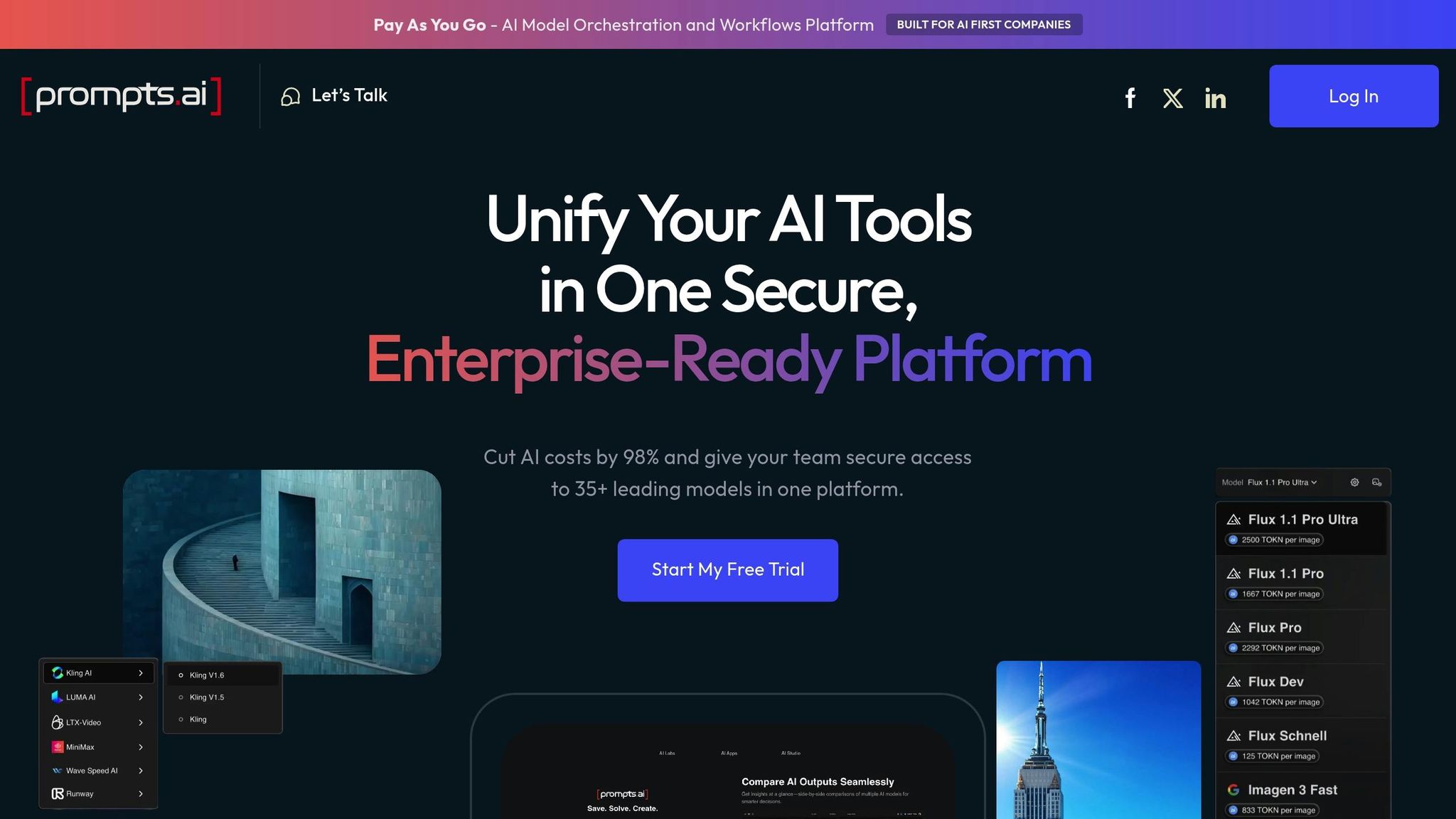
Prompts.ai is an enterprise-grade AI orchestration platform designed to bring over 35 top large language models - including GPT-5, Claude, LLaMA, and Gemini - into one secure, centralized system. Instead of managing multiple AI tools, businesses can use Prompts.ai to simplify operations, reduce complexity, and achieve substantial cost savings, all while maintaining strong governance.
Prompts.ai seamlessly integrates with existing business systems through pre-built connectors for widely-used applications and robust API support. This allows businesses to create workflows that connect CRM, ERP, marketing, and productivity tools without requiring manual effort.
A standout feature of the platform is its visual workflow builder, which enables users to design complex processes with ease. Teams can set up automated workflows to handle tasks like generating personalized emails from CRM updates, extracting data from incoming documents, or routing customer inquiries to the right department. With real-time monitoring and multi-step automation, the platform ensures smooth and efficient operations.
Prompts.ai also synchronizes data across disconnected tools while adhering to SOC 2 Type II, HIPAA, and GDPR compliance standards. This ensures sensitive information remains secure throughout the integration process. Such capabilities not only enhance functionality but also make the platform a cost-effective solution, as reflected in its pricing options.
Prompts.ai offers a tiered subscription model that combines flexibility and affordability, reducing AI-related expenses by 98%. By replacing over 35 separate AI tools with a single platform, businesses can simplify operations and save significantly.
The platform’s pay-as-you-use TOKN credit system ensures businesses only pay for what they use, eliminating recurring fees for unused services and converting fixed AI costs into scalable efficiency.
Prompts.ai offers cloud-based deployment for instant access, eliminating the need for internal IT infrastructure and reducing operational overhead. Businesses benefit from automatic updates, ensuring they always have access to the latest AI models and features.
For enterprise customers with specific compliance or data residency needs, hybrid deployment options provide added control over security and infrastructure, making the platform highly adaptable to varying requirements.
Prompts.ai is tailored for small to medium-sized businesses and enterprise teams aiming to streamline workflows and integrate AI into their daily operations. It’s particularly useful for organizations grappling with the challenges of managing multiple AI tools, hidden costs, and governance issues.
The platform shines in automating customer support and optimizing operations, with the capability to boost team productivity by up to ten times through side-by-side LLM comparisons. Industries such as e-commerce, healthcare (with HIPAA compliance needs), and professional services that must adhere to regulatory standards stand to gain the most from Prompts.ai’s capabilities.
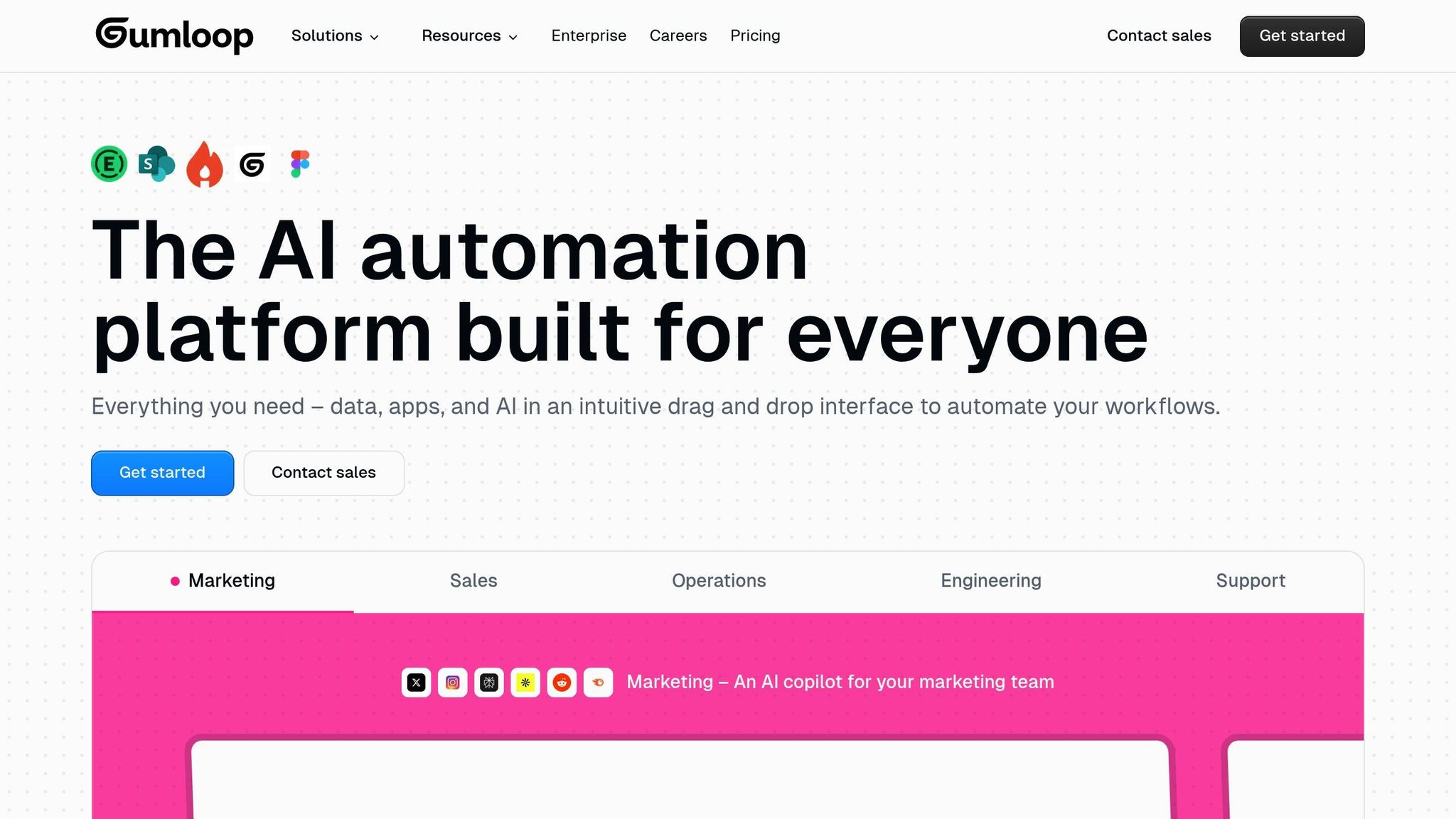
Gumloop is a credit-based workflow automation platform designed to integrate AI into business processes seamlessly. It provides built-in AI models at a fixed cost, simplifying complex workflows using its unique credit-based system.
Gumloop's platform supports a variety of business integrations through its credit-based model. Each action on the platform has a set credit cost. For example, scraping a website uses 1 credit, performing a web search takes 2 credits, and conducting company research requires 30 credits. Most standard integrations consume up to 20 credits per action.
Tasks like organizing and processing website data range from 30–60 credits, depending on complexity. Premium users can link their existing API keys for AI services, reducing the cost per call to just 1 credit. This makes it especially cost-effective for businesses already subscribed to external AI providers.
Gumloop employs a credit-based pricing model with predictable monthly subscription plans. It offers a free tier with 1,000 credits for testing, alongside paid plans that scale with business demands.
| Plan | Monthly Price | Credits | Seats | Concurrent Workflows | Key Features |
|---|---|---|---|---|---|
| Free | $0 | 1,000 | – | 5 | SOC2 Type 2 Compliance |
| Starter | $97 | 30,000 | 1 | 5 | Integration capabilities |
| Pro | $297 | 75,000 | 10 | 5 | Slack support, team collaboration |
| Enterprise | Custom | Custom | Custom | Custom | Dedicated infrastructure, priority support |
All plans include full AI integration under a fixed subscription. The credit cost for AI model usage varies based on complexity: standard AI calls like GPT-4.1 Mini consume 2 credits, advanced models like GPT-4.1 and Claude 3.7 Sonnet require 20 credits, and expert-level models such as OpenAI o3 and GPT-5 use 30 credits per call.
"While the pricing may seem steep compared to other platforms, Gumloop's comprehensive AI features and lack of add-on fees make it a cost-effective solution." - Bannerbear
This straightforward pricing structure ensures predictable costs, laying the foundation for Gumloop's cloud-based deployment.
Gumloop operates as a cloud-based platform, maintaining SOC2 Type 2 compliance across all subscription tiers to meet stringent security standards. The platform handles infrastructure management automatically, so businesses don’t need to worry about maintaining servers or performing updates.
For enterprise clients, Gumloop offers dedicated infrastructure options, providing enhanced scalability and performance. These custom deployments come with priority support and can be tailored to meet specific compliance requirements or data residency needs.
Gumloop is best suited for medium to large businesses that need advanced workflow automation. Like Prompts.ai, it offers a flexible approach to AI integration, adapting to specific business needs. The platform is particularly valuable for companies that regularly extract and organize data from multiple web sources, conduct in-depth company research, or automate complex, multi-step processes involving AI analysis.
The credit system is ideal for businesses with consistent workflow volumes. However, organizations should monitor their usage, as complex workflows can consume over 100 credits per run. For companies already using AI services through direct API subscriptions, Gumloop's 1-credit pricing for premium users adds extra value, making it easier to maximize existing AI investments within its integrated ecosystem.
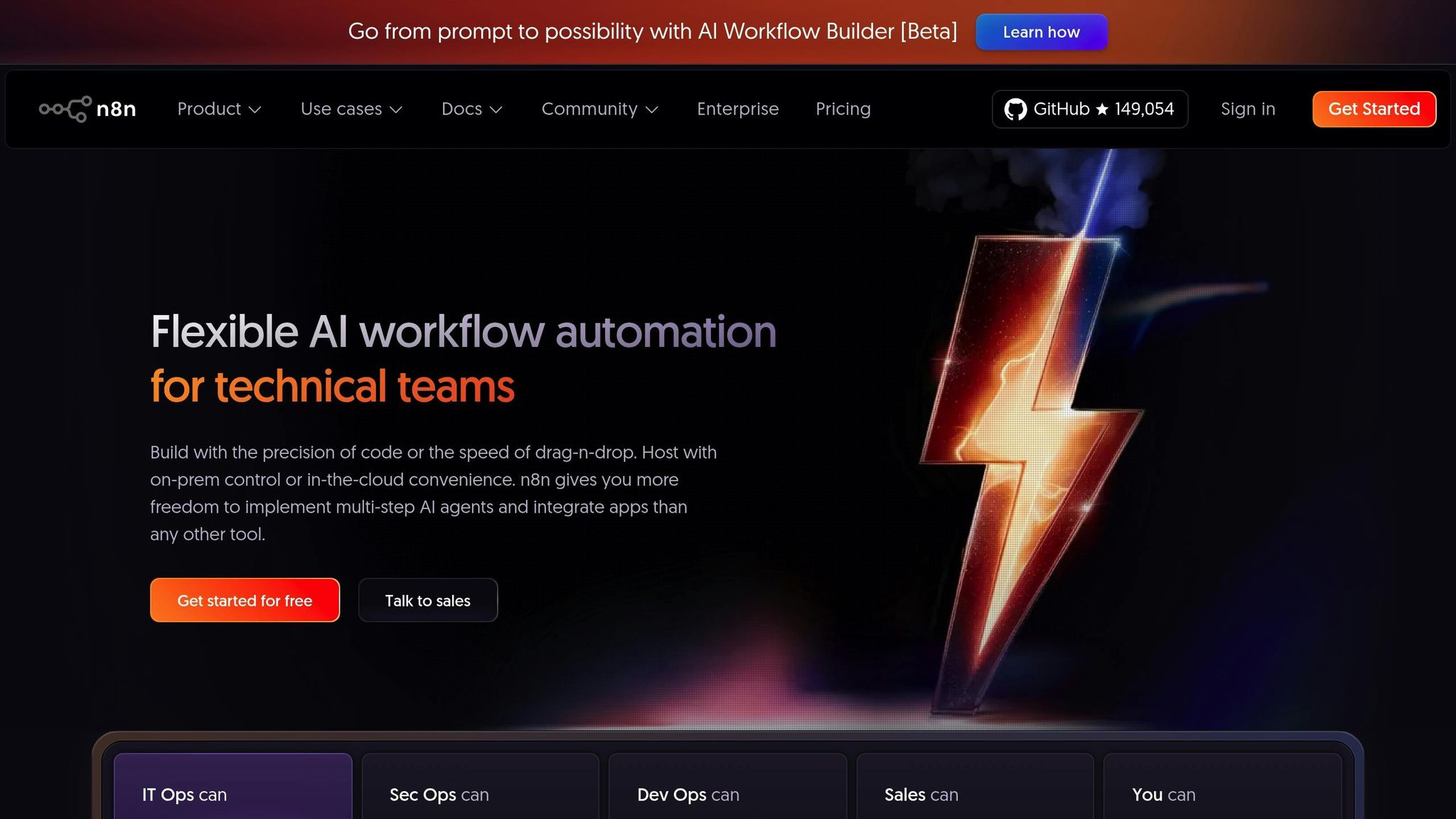
n8n is an open-source workflow automation platform known for its adaptability and extensive integration options. Its open-source foundation allows businesses to customize their automation systems to suit unique requirements. Let’s delve into its integration capabilities, pricing structure, and key use cases.
n8n stands out with its broad selection of pre-built integrations for popular business tools and AI services. Using its intuitive, node-based visual editor, users can create intricate workflows by linking various services seamlessly. The platform supports REST APIs, webhooks, and custom code execution, making it compatible with virtually any API-enabled service. Additionally, n8n incorporates conditional logic and branching, enabling workflows to make decisions automatically based on incoming data. For instance, a workflow could analyze data inputs and redirect tasks to the appropriate team or system.
n8n operates on a freemium model, offering both self-hosted and managed cloud solutions. The self-hosted option is ideal for teams with technical expertise who prefer full control over their infrastructure. On the other hand, the managed cloud option provides automatic updates and scalability without the need for internal maintenance. For businesses with diverse needs, n8n also supports hybrid setups, allowing certain workflows to run on-premises while others operate in the cloud. This flexibility ensures the platform accommodates varying technical resources and compliance demands.
n8n is particularly well-suited for organizations that prioritize customization and require tailored automation solutions. It’s a strong fit for teams with development expertise who need to integrate custom code or internal APIs into their workflows. Its open-source design and deployment versatility make it a compelling option for businesses with stringent security, data residency, or regulatory requirements.
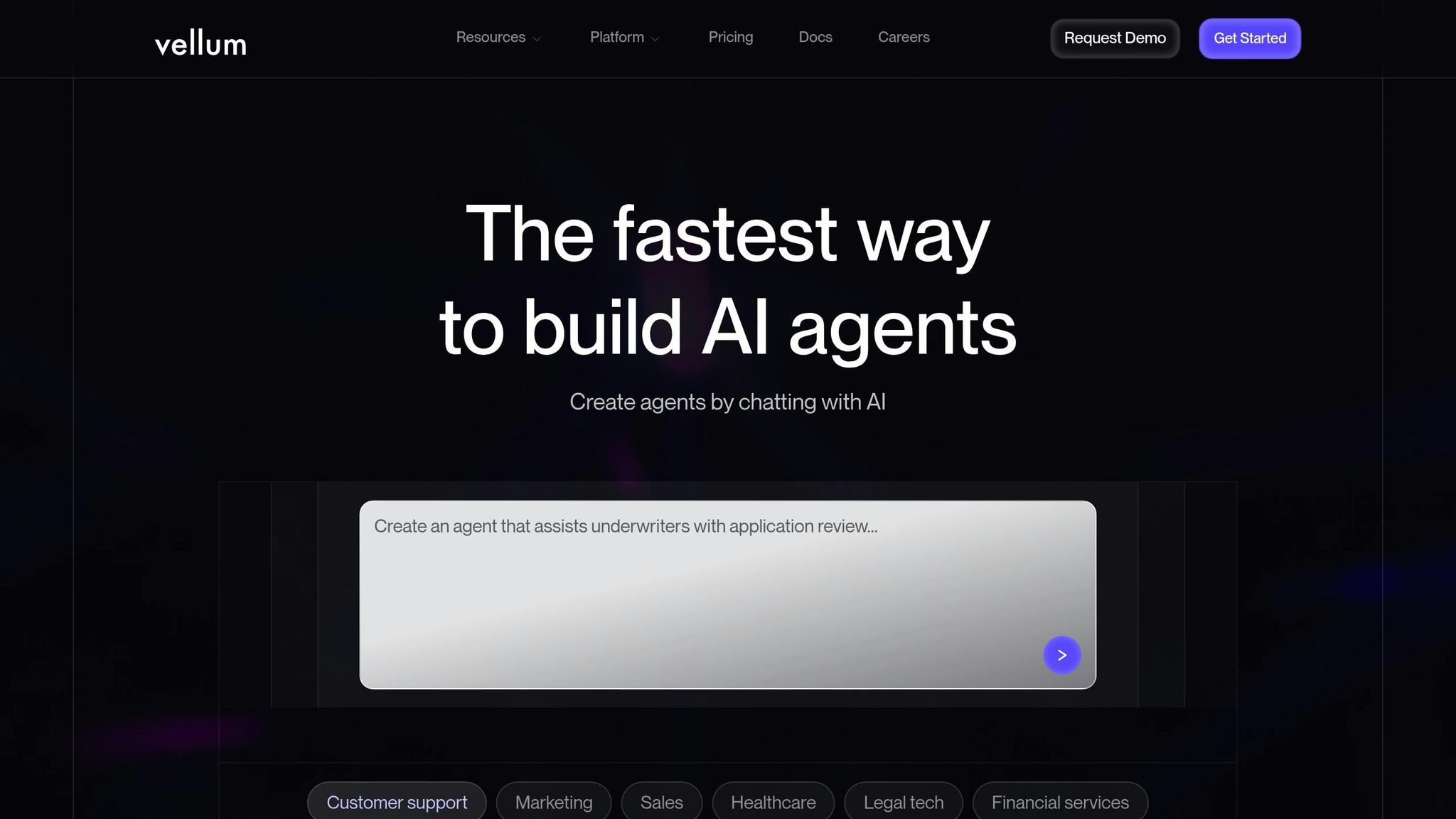
Vellum AI is a platform designed to simplify the process of building, testing, and deploying AI agents into business applications. It offers enterprise-level tools and flexible deployment options, ensuring organizations can meet their security and compliance requirements.
Vellum AI makes it easy for businesses to integrate AI agents into their existing systems through SDK and API integration. These tools allow seamless embedding of AI capabilities into current workflows and applications.
A standout feature of the platform is its Environment management system, which supports Development, Staging, Production, and custom environments like QA. Each environment operates independently, managing its own API keys, document indexes, release history, and monitoring data. This structure ensures smooth and controlled rollouts at every stage of the development process.
Building on its integration capabilities, Vellum AI also provides a range of deployment models to meet the unique needs of businesses.
Vellum AI offers several deployment choices:
These deployment options make Vellum AI a versatile choice for a variety of organizations:
The Environment management system is especially valuable for development teams. It supports structured workflows, enabling safe experimentation in development environments and rigorous validation before moving to production. With its flexible deployment and integration options, Vellum AI provides businesses with a reliable way to streamline operations and enhance efficiency through intelligent automation.
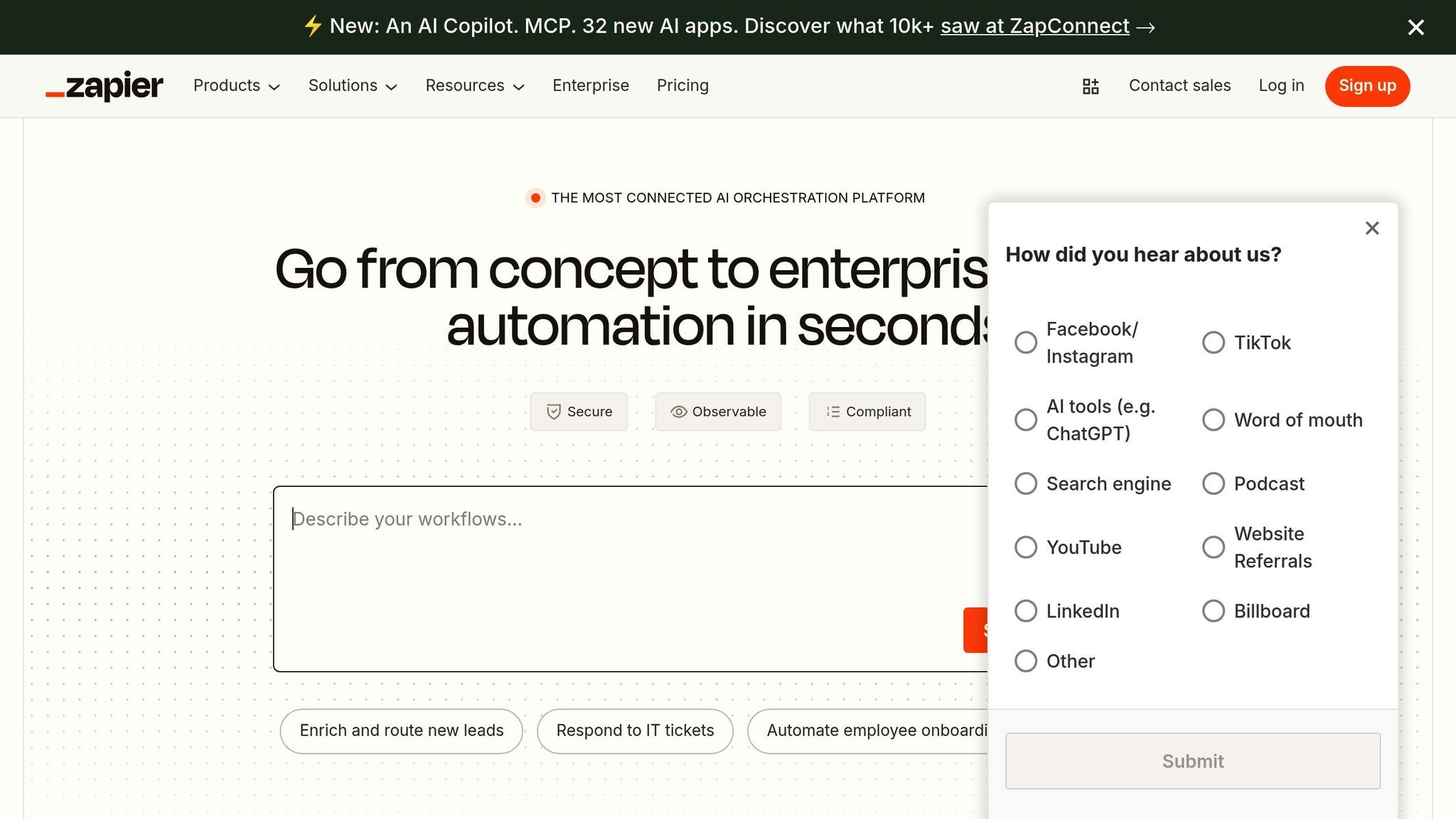
Zapier has carved a niche for itself in the world of AI-enabled workflow platforms, thanks to its vast network of app integrations. This no-code solution connects thousands of business applications, enabling users to automate workflows effortlessly. By employing a trigger-action model, Zapier ensures that specific events in one app can set off a chain of automated responses across others. Its ability to handle multi-step workflows and connect custom applications through webhooks and APIs makes it a versatile tool for businesses of all sizes.
Zapier's standout feature is its extensive app ecosystem, which includes popular tools like CRMs, email marketing platforms, project management software, and AI applications. Its ability to link multiple apps in a single workflow is particularly valuable for streamlining complex processes.
For instance, imagine a new lead is added to a CRM system. Zapier can automatically send a welcome email, create a task in a project management tool, and log the lead's details in a spreadsheet - all without human intervention. Additionally, its webhook and API features allow businesses to integrate proprietary or lesser-known tools, ensuring that even niche applications can be part of automated workflows.
Zapier also incorporates conditional logic through its Filter and Path features. These tools enable businesses to define rules that dictate which actions occur based on specific data conditions, creating smarter and more tailored automation.
Zapier employs a task-based pricing structure, where each action completed in a workflow counts as one task. The platform offers several flexible pricing options:
Zapier's combination of robust integration capabilities and straightforward pricing makes it an appealing choice for a wide variety of users.
Small and medium-sized businesses appreciate its ease of use and quick setup. Marketing agencies, for example, can seamlessly sync lead data between ad platforms and CRMs, while e-commerce businesses rely on Zapier to update inventory across multiple sales channels.
Sales and marketing teams utilize the platform to automate lead nurturing, scoring prospects based on their interactions, and routing qualified leads to the right representatives. By connecting marketing tools with sales systems, Zapier ensures smooth transitions between departments.
Operations teams eliminate tedious manual data entry by automating processes like syncing employee records between HR and payroll systems or creating support tickets from customer feedback forms. Remote teams also benefit from automated notifications and status updates, ensuring critical information is shared across time zones without delays.
Perhaps most importantly, Zapier's no-code approach empowers non-technical users to optimize workflows independently. By reducing reliance on IT teams, departments can implement automation quickly, accelerating efficiency and reducing bottlenecks. This accessibility makes Zapier a key player in the push toward streamlined business operations.
Make, formerly known as Integromat, stands out as a powerful tool for integrating business processes through AI-driven automation. Its hallmark feature is the ability to create advanced data transformations using an intuitive, visual flowchart interface. Unlike basic automation tools that rely on simple trigger-action setups, Make empowers users to design intricate workflows with conditional paths and data manipulation - all with a straightforward drag-and-drop system.
A key strength of Make is its ability to process and transform data seamlessly as it moves between applications. Users can branch workflows, aggregate data, and apply complex logic - all without needing to write a single line of code. This approach is particularly useful for businesses dealing with diverse data formats or workflows that require multiple decision points.
At the heart of Make's functionality is its scenario-based architecture, which transforms workflows into visual maps of interconnected modules. The platform integrates with over 1,000 applications and services, including widely used tools such as Salesforce, Google Workspace, Slack, and various e-commerce platforms.
What sets Make apart is its advanced data handling capabilities. It can parse JSON, XML, and CSV files, handle mathematical calculations, and manipulate text strings - all within a single workflow. For example, a business can design a scenario that pulls customer data from various sources, calculates lifetime value, applies scoring rules, and routes high-value prospects to specific sales teams, all while converting data formats as needed.
Make also offers HTTP modules for connecting to nearly any web service with an API, along with webhook functionality for real-time data processing. Additional tools include built-in features for working with arrays, iterating through data sets, and consolidating information from multiple sources into a single output.
Reliability is another standout feature. Make’s error-handling tools allow users to set fallback routes and retry mechanisms, ensuring workflows remain operational even when individual steps encounter issues. This level of dependability is essential for businesses that rely on uninterrupted data synchronization across systems.
These capabilities, combined with its flexible pricing, make Make a versatile choice for businesses of all sizes.
Make employs an operations-based pricing model, where every action performed by a module counts as one operation. This approach often offers better value for businesses with complex workflows compared to simpler task-based pricing systems.
The platform offers multiple pricing tiers to suit various needs:
For businesses needing additional capacity, extra operations can be purchased in bundles, with discounts applied as volume increases. This flexible pricing structure allows organizations to scale their automation efforts at their own pace.
Make’s blend of advanced features and affordability makes it particularly appealing to mid-market businesses and enterprises that require robust data processing and workflow automation. Its visual interface is a favorite among operations teams, marketing professionals, and business analysts who need to build complex integrations without technical expertise.
E-commerce businesses benefit from Make’s ability to synchronize inventory across multiple sales channels, process orders with detailed fulfillment rules, and manage customer data across various platforms. The platform’s tools for handling product catalogs, pricing updates, and order routing streamline operations for businesses selling through multiple marketplaces.
Marketing agencies leverage Make to build intricate lead-nurturing systems. These workflows can score leads based on multiple criteria, distribute them according to detailed assignment rules, and keep data in sync across CRM platforms, email marketing tools, and advertising systems. The visual builder makes it easy for marketing teams to understand and refine automation workflows without needing IT support.
Service-based businesses use Make to streamline client onboarding, project management, and billing processes. The platform handles multi-step approval workflows, generates documents, and manages communication sequences that adjust dynamically based on client responses or project milestones.
Make is an excellent choice for organizations seeking advanced automation capabilities without the complexity or expense of traditional enterprise solutions. Its combination of power, ease of use, and cost-effective pricing makes it a go-to platform for connecting diverse business tools and optimizing workflows.

Microsoft Power Automate is a robust automation platform designed for businesses already leveraging the Microsoft ecosystem. Built on Microsoft's cloud infrastructure, it seamlessly connects Microsoft 365 applications with other services, making it an excellent choice for organizations reliant on Microsoft's suite of tools. Like other top-tier workflow solutions, Power Automate brings together various applications into unified, automated processes.
One of its standout features is its integration with Microsoft's AI tools, such as AI Builder, which allows users to embed machine learning models into workflows without needing advanced data science expertise. Additionally, its library of customizable templates helps businesses streamline deployment and adapt workflows to meet specific needs. This makes it ideal for tasks like document processing, sentiment analysis, and predictive analytics, enhancing operational efficiency.
Power Automate excels in connecting Microsoft services with other business applications and custom APIs. Its robust connector ecosystem ensures workflows run smoothly across multiple systems, particularly within the Microsoft 365 suite.
The integration with AI Builder enables users to utilize pre-built models for tasks such as form processing, object detection, and text classification. For example, a workflow could automatically extract data from invoices, validate it against records, and route approvals through Microsoft Teams - all without human intervention.
Custom connectors further enhance flexibility, allowing businesses to integrate proprietary systems. The platform also supports complex data transformations through its dataflows feature and extends automation to local desktop environments using Power Automate Desktop and robotic process automation (RPA). This level of integration ensures streamlined, AI-powered processes across the organization.
Power Automate offers a usage-based pricing model, making it accessible to organizations of all sizes, from small teams to large enterprises. Its tiered pricing structure provides flexibility, catering to various business needs and usage levels.
The platform supports several deployment models to address different organizational and compliance requirements. Cloud deployment through Microsoft Azure ensures automatic updates, global availability, and access to Microsoft's security and compliance frameworks. For hybrid setups, data gateways enable secure connections to on-premises systems, while Power Automate Desktop extends automation to local environments. Specialized government cloud options are also available for organizations with unique compliance needs.
Power Automate is particularly well-suited for organizations heavily invested in Microsoft products. Enterprises gain from features like data loss prevention, environment management, and detailed analytics, enabling them to create advanced workflows for approvals, document handling, and cross-application data synchronization.
Specific industries have found unique applications for Power Automate:
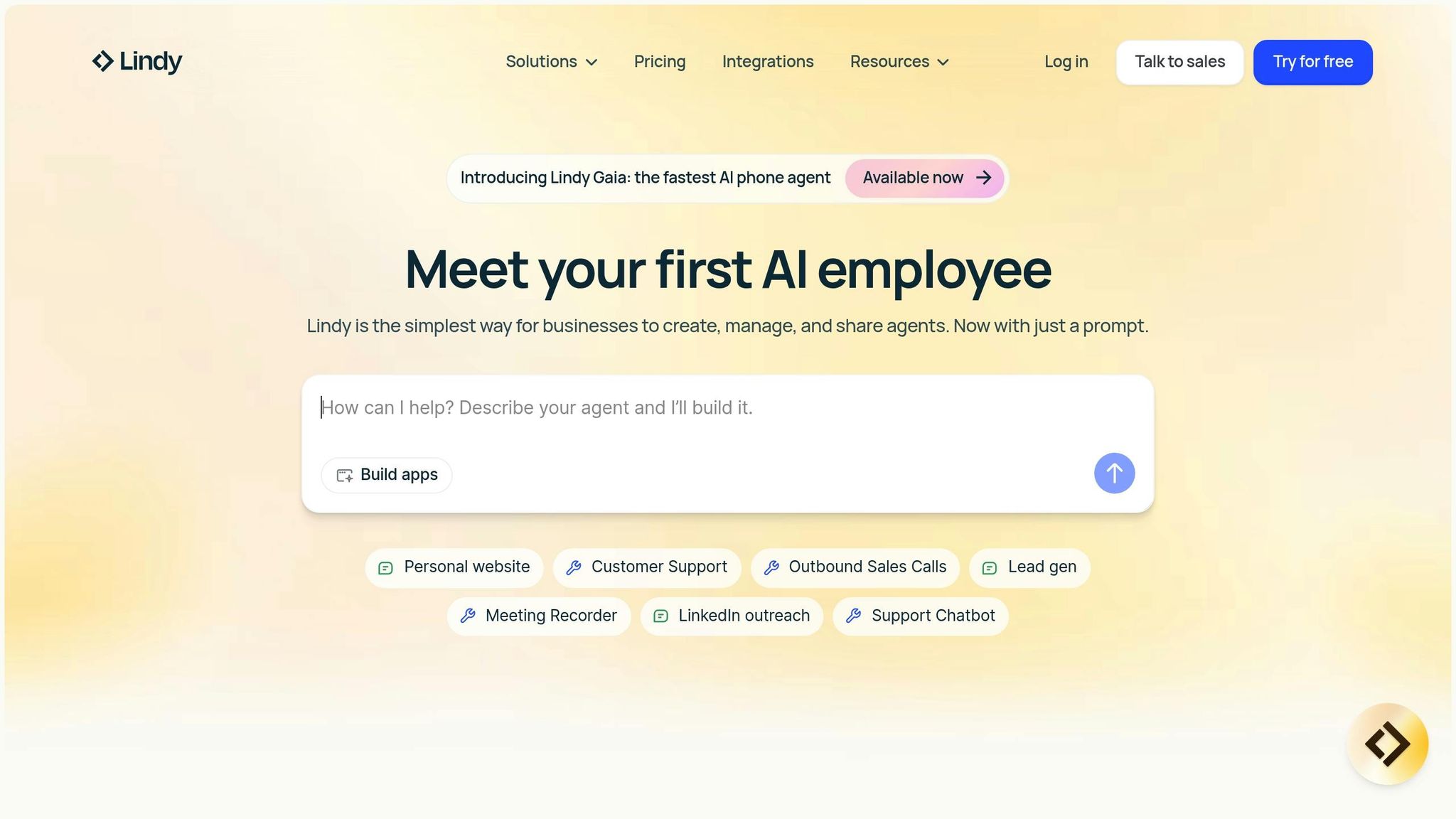
Lindy operates on a credit-based pricing system, where various actions consume different amounts of credits, leading to fluctuating monthly expenses. It provides two options: a Free plan for basic exploration and a Pro plan for more advanced automation features. The platform connects effortlessly with popular business tools through pre-built integrations, enabling smooth workflow automation despite the credit-based structure. This model encourages users to plan their usage strategically, balancing efficiency and cost management.
Selecting the right AI integration tool depends on your business priorities, technical setup, and budget. Here's a quick look at how Prompts.ai stands out:
| Platform | Starting Price | Deployment Options | Key Strengths |
|---|---|---|---|
| Prompts.ai | $0/month (Pay-As-You-Go) | Cloud-based | Access to 35+ leading LLMs, enterprise-grade governance, up to 98% cost savings |
Prompts.ai shines with its user-friendly interface and seamless onboarding, accommodating businesses of all sizes and technical expertise. Its strong governance and compliance features ensure secure data management and auditability, making it ideal for both small teams and large organizations.
The platform’s scalable cloud-based design and pay-as-you-go pricing model make it flexible for businesses as their needs evolve. By centralizing access to over 35 leading language models, Prompts.ai simplifies model selection, streamlines prompt workflows, and provides real-time cost management.
With a focus on cost efficiency, scalability, and secure operations, Prompts.ai is a powerful choice for businesses integrating AI.
Integrating AI into your business operations presents a powerful way to streamline workflows and increase productivity. The key lies in finding the right solution that aligns with your budget, technical capabilities, and specific business needs.
For smaller teams, straightforward automation tools may suffice, while larger enterprises often require platforms with advanced governance features and access to a wide range of models. Among the available options, Prompts.ai stands out for its comprehensive approach. With access to over 35 language models, flexible pay-as-you-go pricing, robust governance tools, and the potential to cut costs by up to 98%, it offers a compelling solution for businesses of all sizes.
Take time to review your existing workflows and identify areas where AI could address inefficiencies. Consider factors like data security, team size, and future growth when evaluating platforms. Many providers offer free trials or starter plans, allowing you to test features before committing.
A successful AI platform should grow alongside your business, delivering secure and efficient operations while improving overall performance. Explore available options carefully to find the one that aligns best with your goals and sets your business up for long-term success.
Prompts.ai places a strong emphasis on data security and regulatory compliance, ensuring businesses can confidently integrate AI into their operations. We use advanced encryption protocols to protect sensitive information, both during storage and transmission, keeping it secure from unauthorized access.
Our platform also aligns with top compliance standards, including GDPR and CCPA, and continuously updates its practices to meet changing regulations. By merging cutting-edge security measures with a dedication to compliance, we deliver AI solutions that seamlessly fit into your business while upholding trust and reliability at every step.
Prompts.ai offers a pay-as-you-go pricing model designed to help businesses cut costs by paying only for what they use. Rather than locking into high recurring fees or lengthy contracts, you can purchase TOKN credits and adjust your usage as needed.
This approach keeps spending in check, making it a great fit for businesses of all sizes aiming to manage budgets efficiently while still leveraging advanced AI tools. It’s a practical way to align your expenses with your actual needs, ensuring smarter financial management.
Prompts.ai is a great fit for businesses spanning various industries, especially those aiming to improve efficiency and simplify operations through AI. It's particularly useful in areas like sales, marketing, and operations, where automating routine tasks and refining workflows can lead to significant time savings and higher productivity.
Whether you're a small business exploring AI for the first time or a larger organization seeking advanced automation solutions, Prompts.ai is built to meet your needs. Its scalable design makes it an adaptable tool for enhancing processes, automating strategies, and streamlining content creation across different teams and departments.


